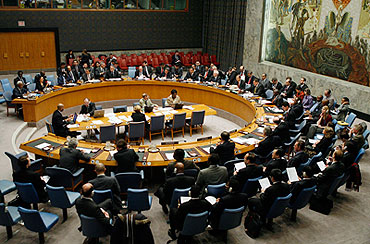| Press Release |
TRIBUNAL
|
| (Exclusively for the use of the media. Not an official document) |
|
The Hague, 29 December 2010
CT/MOW/1382e
Security Council Adopts Resolution on the International Residual Mechanism for Criminal Tribunals (IRMCT)
 |
The United Nations Security Council (UNSC) on 22 December adopted a Resolution to establish a new body to finish the remaining tasks of the International Criminal Tribunal for the former Yugoslavia (ICTY) and the International Criminal Tribunal for Rwanda (ICTR) after the completion of their mandates.
The International Residual Mechanism for Criminal Tribunals (IRMCT) will have two branches, one for each Tribunal, and will begin functioning on 1 July 2013 for the ICTY and on 1 July 2012 for the ICTR. The seat of the two branches of the Residual Mechanism will be determined through separate agreements between the United Nations and the host states of the branches and acceptance by the Security Council.
The Mechanism will continue the jurisdiction, rights and obligations and essential functions of the ICTY and the ICTR. In the Resolution, the Security Council concluded that “the international residual mechanism should be a small, temporary and efficient structure, whose functions and size will diminish over time, with a small number of staff commensurate with its reduced functions”.
The Statute of the Mechanism was also adopted by the Security Council. The Mechanism will have the power, among other things, to prosecute the most senior persons indicted by the Tribunal who are arrested after the completion of its mandate as well as those persons who interfere with the administration of justice. The Mechanism will not be able to raise new indictments. The new body will also be able to conduct review proceedings, supervise the enforcement of sentences and decide on pardon or commutation of sentences.
The UNSC requested the ICTY and ICTR to take all possible measures to complete their work no later than 31 December 2014. All States, especially States where fugitives are suspected to be at large, are asked to further intensify cooperation with the Tribunals and the Mechanism and secure the arrest or surrender of the remaining fugitives.
The Resolution calls for the UN Secretary General to submit a draft of Rules of Procedure and Evidence of the Mechanism to the Security Council by 30 June 2011. These Rules will be based on the Tribunal’s existing Rules and, unless the Security Council decides otherwise, will take effect after the Mechanism’s judges adopt the Rules.
The Resolution welcomes the Secretary-General’s report on the archives and the seat of the residual mechanism for the Tribunals. In his report, dated May 2009, the Secretary-General recommended that the Tribunal’s archives and the seat of the Mechanism be placed at the same location, not only for budgetary reasons, but also for logistical ones, e.g. when archives need to be accessed by the Mechanism. This would also reduce duplicative tasks that could exist if a separate archival entity existed for the Mechanism. The Resolution requests the Secretary-General to prepare, in consultation with the Security Council, an information security and access regime for the archives of the Tribunals and the Mechanism.
It also requests the Tribunals and the Mechanism to cooperate with the countries of the former Yugoslavia and with Rwanda, as well as with interested entities, to facilitate the establishment of information and documentation centres by providing access to copies of public records of the archives of the Tribunals and the Mechanism, including through their websites.
Since its inception 17 years ago, the ICTY, which is based in The Hague, has indicted 161 persons for war crimes committed on the territory of the former Yugoslavia. The proceedings against 125 individuals have been completed, with only two indictees remaining at large – Ratko Mladić and Goran Hadžić.
* * *
The full text of the Resolution can be found at:
In English
In French
*****
International Criminal Tribunal for the former Yugoslavia
For more information, please contact our Media Office in The Hague
Tel.: +31-70-512-8752; 512-5343; 512-5356 Fax: +31-70-512-5355 - Email: press [at] icty.org
Follow ICTY on Twitter and Youtube

